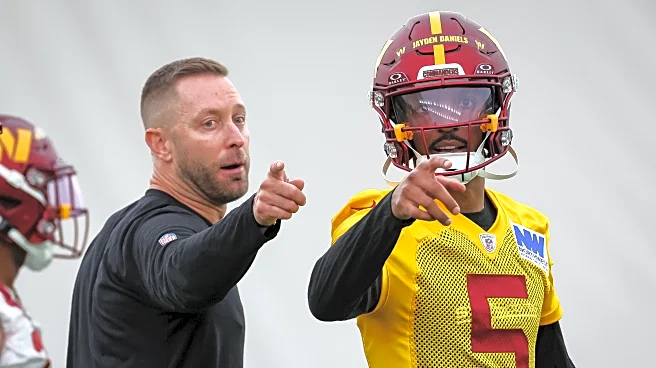What's Happening?
Starbucks union members have announced plans to strike at U.S. stores on November 13, coinciding with the company's Red Cup Day, unless a contract agreement is reached. Red Cup Day is a significant event for Starbucks, known for distributing free reusable
red cups and being one of the busiest days of the year. Starbucks Workers United, the union representing baristas, has indicated that workers in at least 25 cities are prepared to strike, with more locations potentially joining if substantial progress is not made in contract negotiations. Currently, 550 of Starbucks' 10,000 company-operated U.S. stores are unionized, with more stores voting to unionize since 2021. However, Starbucks closed 59 unionized stores in September as part of a restructuring effort. The union and Starbucks have yet to finalize a labor contract, despite a promise made in December 2023 to reach an agreement by the end of 2024. The union claims progress has stalled under the leadership of Brian Niccol, the new chairman and CEO.
Why It's Important?
The impending strike highlights ongoing tensions between Starbucks and its unionized workforce, which could impact the company's operations and reputation. A strike on Red Cup Day, a major promotional event, could disrupt business and affect customer experience. The union's demands for significant pay increases and changes to operational procedures reflect broader labor movements seeking improved working conditions and compensation. Starbucks' response, emphasizing its existing pay and benefits, suggests a challenging negotiation process ahead. The outcome of these negotiations could set precedents for labor relations in the retail industry, influencing other companies facing similar unionization efforts.
What's Next?
If the strike proceeds, Starbucks will need to manage operations at affected stores while maintaining service at its 7,000 licensed locations, such as those in airports. The company may face increased pressure to return to the bargaining table and address union demands. The union's actions could inspire similar movements in other sectors, potentially leading to more widespread labor actions. Stakeholders, including customers and investors, will be closely monitoring the situation, as Starbucks shares have already seen a nearly 4% increase in trading amid the news.
Beyond the Headlines
The strike threat underscores the growing influence of labor unions in the retail sector, challenging traditional corporate practices. It raises questions about the balance between corporate profitability and employee welfare, especially in light of executive compensation packages. The union's demands for operational changes, such as controlling mobile orders, reflect a push for greater worker autonomy and influence over business practices. This development could lead to broader discussions on the role of unions in shaping corporate policies and the future of labor relations in the U.S.

















